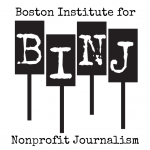BINJ identifies gaps and builds bridges for communication—between various publications, people and their representatives, and communities and journalists.
For the journalists who contract with us, we provide editorial direction, as well as access to the sort of critical institutional memory that isn’t available in many small newsrooms, especially for freelancers. There isn’t nearly enough support for freelancers and independent journalists to do the work that desperately needs to be done, from basic coverage of things like city halls and school committees to deeper investigative dives. BINJ is able to not only provide paid work and bylines, but also offers everything from workshops on things like filing FOIA requests and tax returns as a freelancer, to more general services like perpetually boosting our local media ecosystem.
Though we are demanding of our contributors in terms of the integrity and quality of their work, we are different from most other outlets and reporting incubators in how we pace our reporters. We understand that many of them have full-time jobs and/or class schedules and/or in some cases personal hardships including housing instability. Out of respect for those priorities, we move at whatever speed is appropriate. The individual cases and ability levels of freelancers vary, but we believe that our approach has helped us reach milestones we hadn’t foreseen, like having about half of our features produced by reporters who published their first-ever long-form piece through BINJ.



